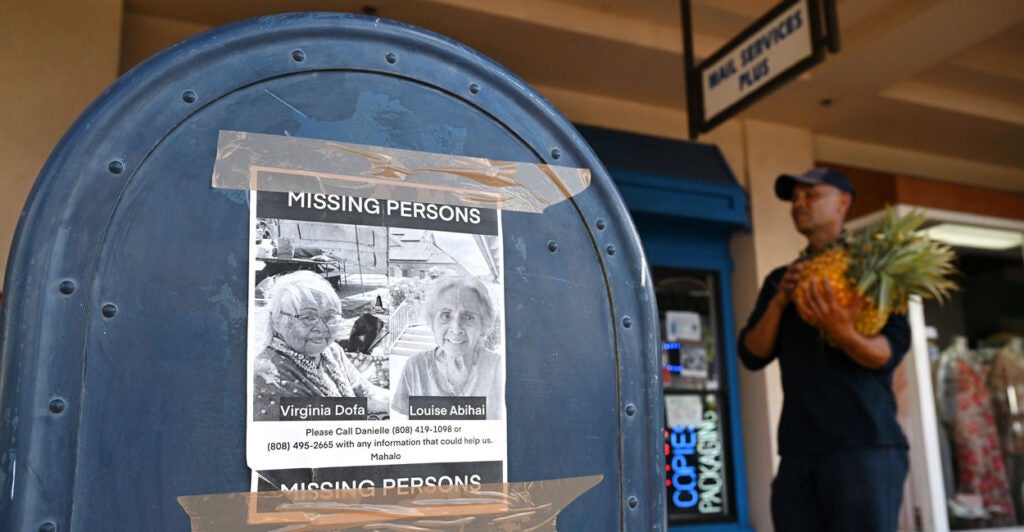Earlier this week, my colleagues Tony Kinnett and Tim Kennedy visited Hawaii to report for The Daily Signal on the deadliest U.S. wildfire in over a century. Their trip coincided with President Joe Biden’s head-scratching island adventure, which did little to restore confidence with Hawaiians after his callous “no comment” quip about the disaster days earlier.
With more than 100 people dead and over 1,000 others missing, Biden sparked even more outrage for comparing a small kitchen fire in his Delaware house to the horrific Hawaii blaze.
The president arrived in Hawaii having promised “a one-time payment of $700 per household to applicants who were displaced from their homes and have critical needs.” As multiple media outlets reported, the checks were seen as “insulting” and a “slap in the face.”

Perhaps that’s because Hawaiian households are receiving $700 payments from the Biden administration while Ukraine has already received $7,000 per household. Admittedly, a large portion of that American money is for weapon systems, but some of the money is going to domestic programs and all of it is going to a country that ranks high on the corruption scale.
The Heritage Foundation’s Richard Stern, director of the Grover M. Hermann Center for the Federal Budget, ran the numbers on the $113 billion the U.S. has allocated in aid to Ukraine and found that it totals nearly $900 per American household, which will ultimately be paid through taxes or inflation (to be precise, it’s $884). The eye-popping number helps put the massive 12-figure $113 billion in perspective.
Using the same formula, albeit with the smaller Ukrainian population, Stern estimates that the aid comes out to roughly $6,848 per household in Ukraine. According to the country’s National Statistical Office, there are 16.5 million households in Ukraine.
It’s not hard to understand why some Americans, particularly those affected by a disaster like the Hawaii wildfire, might be upset about the disparity. Unless, of course, you’re a neoconservative.
In the past few days, pro-war media outlets like National Review and “enlightened experts” have expressed outrage at The Heritage Foundation for taking a commonsense position that’s supported by 55% of Americans. (The Daily Signal is Heritage’s news and commentary outlet.)
Heritage’s position is straightforward:
- Congress shouldn’t attach the aid to domestic disaster relief as Biden proposed.
- Lawmakers shouldn’t appropriate anything more until Biden offers a robust plan to end the war soon.
- And the American people deserve transparency for how their money is being spent.
Regardless of your views on Russia’s invasion of Ukraine—personally, I’m proud of my Ukrainian heritage and remain hopeful that Ukraine ultimately defeats Russia—these are not radical or controversial requirements to expect from the commander in chief and members of Congress.
Yet among the neoconservative crowd, these requirements have elicited howls on social media and long screeds on their websites. They say former President Ronald Reagan is “rolling over in his grave” and it’s “disgustingly mendacious framing” to make such a comparison.
National Review wrote a total of five articles about Heritage in the span of 24 hours with headlines ranging from “The Heritage Foundation’s Odd Shift Left” to “What’s the Problem Here?”
Let’s first put to rest any concern that Heritage is moving left. It might make for a good click-bait headline, but it’s truly a laughable assertion. Columnist John Noonan compares Heritage to “Bay Area Democrats” for noting—correctly, mind you—that Biden is sending $700 to Hawaiians and taking $900 from Americans for Ukraine.
Those are the facts, man.
Not to be outdone, Noah Rothman takes aim at my former Heritage colleague Rachel Bovard, currently executive director of the Senate Steering Committee. Her offense? Highlighting a point from National Review’s own Dominic Pino, who admits that “not all the money goes to Ukrainians. Much of it goes to U.S. defense contractors, which employ Americans and contribute to U.S. economic output.”
Bingo.
Pino, whose flawed analysis Stern easily refuted, seems to indicate we should support aid to Ukraine because it helps our defense industry and creates jobs here. Government spending for the sake of creating jobs is not a great policy choice, and it ignores what should really be debated: Is expending these resources—without a strategy, with no end in sight, in an environment of corruption—something we can afford? Is it the best use of resources? Should it be packaged with aid to American citizens?
Bovard established a strong social media following because of her candid takes on conservative policy debates like this one. She’s an influential and important voice on these matters, and in this case, she’s correct to call attention to blind devotion to more aid which serves the K Street cartel in Washington. For doing so, she’s faced attacks from neoconservatives—both publicly and privately. Knowing her as I do, she won’t be intimidated.
Neither will Heritage, which—under the leadership of President Kevin Roberts—made the decision to refuse funding from the defense industry. It’s not because we do not appreciate their contribution to the defense of our nation or the need we have for them to be strong so we can confront China and other adversaries and have a strong national defense. It’s a decision that protects our ability to provide independent analysis without even the perception of influence on the part of any defense contractor.
Heritage exists to represent the interests of everyday Americans in the imperial city of Washington, D.C. Increasingly, a majority of those Americans want the United States to stop sending aid to Ukraine.
It doesn’t take a genius to figure out why they oppose adding another $24 billion to the taxpayers’ tab.
The Federalist’s John Daniel Davidson captures it in his critique of the neocons:
Reasonable people can disagree about how much support Americans owe the Ukrainians in their struggle against Russia. But even if one accepts that we should be supporting Ukraine to the hilt, it’s fair to ask what the plan is to end the war—and no, ‘until Russia is totally defeated’ is not a serious response, much less a strategy. This war, like nearly all wars, will end with a negotiated political settlement. Since American taxpayers are funding the war, they deserve to know if our leaders have a plan to end it that doesn’t amount to World War III.
It is the people’s money, after all. If we don’t get answers, our elected representatives shouldn’t approve another cent.
Have an opinion about this article? To sound off, please email [email protected], and we’ll consider publishing your edited remarks in our regular “We Hear You” feature. Remember to include the URL or headline of the article plus your name and town and/or state.































